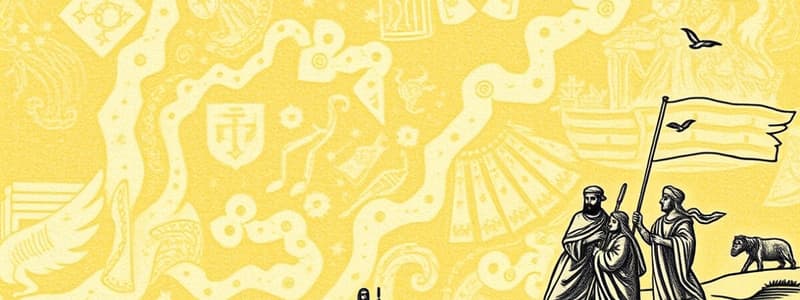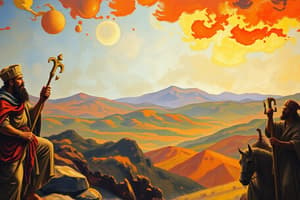Podcast
Questions and Answers
What significant event marked the division of the kingdom after Solomon's reign?
What significant event marked the division of the kingdom after Solomon's reign?
- The reign of King David
- The construction of the First Temple
- The split into Israel and Judah (correct)
- The rise of foreign invasions
Which king of Israel is known for his idolatry and opposition to the prophet Elijah?
Which king of Israel is known for his idolatry and opposition to the prophet Elijah?
- Josiah
- Ahab (correct)
- Solomon
- Hezekiah
The prophetic theme of 'Call to Repentance' emphasizes which key aspect?
The prophetic theme of 'Call to Repentance' emphasizes which key aspect?
- The certainty of prophetic miracles
- The inevitability of divine judgment
- The need to return to the covenant with God (correct)
- The assurance of political stability
What miracle did Elijah NOT perform?
What miracle did Elijah NOT perform?
Which kingdom fell to Assyria in 722 BCE due to idolatry and poor political choices?
Which kingdom fell to Assyria in 722 BCE due to idolatry and poor political choices?
How did Josiah contribute to the religious life of Judah?
How did Josiah contribute to the religious life of Judah?
What role did Elisha play in the prophetic tradition?
What role did Elisha play in the prophetic tradition?
What was the primary cause of Judah's longer survival compared to Israel?
What was the primary cause of Judah's longer survival compared to Israel?
Flashcards are hidden until you start studying
Study Notes
Historical Context
- Time Period: Covers the history of Israel and Judah from the last years of King David’s reign to the Babylonian exile.
- Division of the Kingdom: After Solomon's reign, the kingdom split into Israel (Northern Kingdom) and Judah (Southern Kingdom).
- Political Climate: Marked by instability, foreign invasions, and idolatry, particularly under various kings.
- Prophetic Influence: Prophets like Elijah and Elisha play crucial roles in guiding the people and kings.
Key Characters
- Elijah: A prophet who confronts Baal worship and performs miracles, representing God's power.
- Elisha: Successor to Elijah, known for his miracles and teachings, emphasizing God's compassion.
- Various Kings:
- Ahab: Notorious for idolatry and opposing Elijah.
- Hezekiah: Noted for reforms and faithfulness to God.
- Josiah: Known for rediscovering the Book of the Law and instituting major religious reforms.
Themes of Prophecy
- Divine Judgment: Prophets warn of impending judgment for unfaithfulness and idolatry.
- Restoration and Hope: Despite judgment, messages of future restoration and hope are prevalent.
- Call to Repentance: Emphasis on returning to God and the covenant, highlighted through prophetic messages.
Miracles and Signs
- Miracles by Elijah: Includes raising the dead, calling down fire, and miraculous provision (e.g., the widow's oil).
- Miracles by Elisha: Healing Naaman of leprosy, multiplying food, and various acts of divine intervention.
- Signs as Divine Validation: Miracles serve as signs to authenticate the prophets' messages and authority from God.
Kingdoms of Israel and Judah
- Israel (Northern Kingdom):
- Fell to Assyria in 722 BCE due to idolatry and political alliances.
- Kings often portrayed as evil, leading the nation into sin.
- Judah (Southern Kingdom):
- Survived longer but fell to Babylon in 586 BCE.
- Had a mix of righteous and unrighteous kings; notable reforms under Hezekiah and Josiah.
- Political Relationships: Frequent alliances and conflicts between Israel and Judah, as well as with surrounding nations like Assyria and Babylon.
Historical Context
- Timeframe spans from the latter years of King David’s reign to the Babylonian exile.
- Following Solomon's death, the kingdom divided into the Northern Kingdom (Israel) and the Southern Kingdom (Judah).
- The political landscape was characterized by instability, frequent foreign invasions, and rampant idolatry.
- Prominent prophets, such as Elijah and Elisha, provided guidance to both the populace and the rulers.
Key Characters
- Elijah: A significant prophet challenging Baal worship, known for remarkable miracles showcasing divine power.
- Elisha: Successor to Elijah, recognized for his compassion and numerous miracles reflecting God's grace.
- Ahab: A king infamous for leading his people into idolatry and opposing the prophet Elijah.
- Hezekiah: A reformative king celebrated for his faithfulness to God and restoring worship practices.
- Josiah: A king pivotal in rediscovering the Book of the Law, initiating extensive religious reforms.
Themes of Prophecy
- Divine Judgment: Prophecies frequently relay warnings of impending divine consequences for idolatry and infidelity.
- Restoration and Hope: Despite impending judgment, prophetic messages consistently convey themes of future restoration and hope.
- Call to Repentance: Prophets stress the importance of returning to God and honoring the covenant, advocating for communal repentance.
Miracles and Signs
- Miracles of Elijah: Notable acts include raising a child from the dead, calling fire from heaven, and providing miraculous sustenance, such as the widow's oil.
- Miracles of Elisha: Major acts include healing Naaman's leprosy and multiplying food, illustrating God's ongoing intervention.
- Signs as Divine Validation: Miracles serve as evidence validating the prophets' authority and divine messages.
Kingdoms of Israel and Judah
- Israel (Northern Kingdom): Conquered by Assyria in 722 BCE, attributed to widespread idolatry and poor political choices; kings often depicted as corrupt.
- Judah (Southern Kingdom): Endured longer than Israel but eventually succumbed to Babylon in 586 BCE; experienced a mix of righteous and corrupt rulers.
- Distinctive reforms were enacted during the reigns of significant kings like Hezekiah and Josiah, aiming to restore proper worship.
- Political dynamics involved regular alliances and conflicts with neighboring powers, notably Assyria and Babylon.
Studying That Suits You
Use AI to generate personalized quizzes and flashcards to suit your learning preferences.




